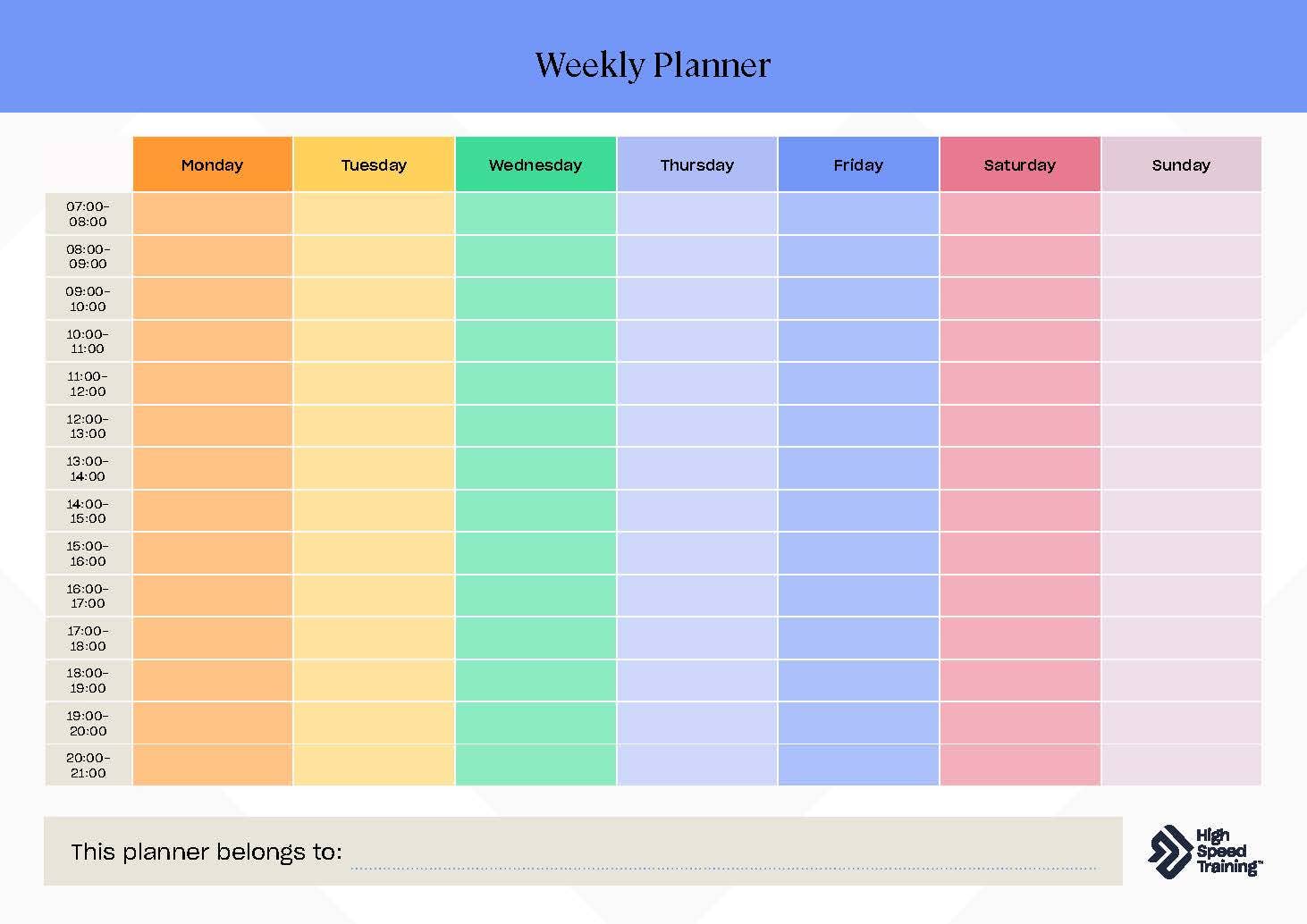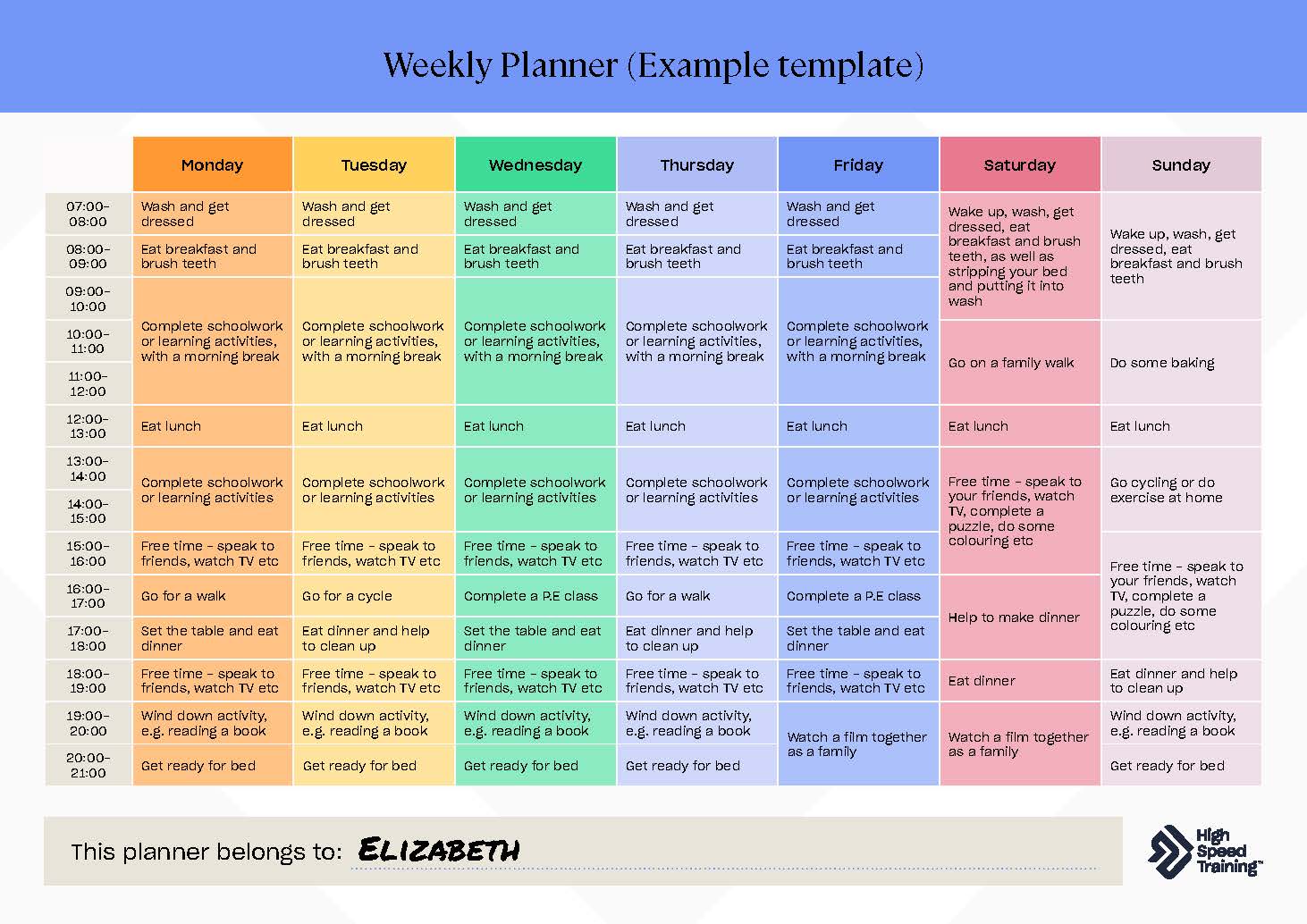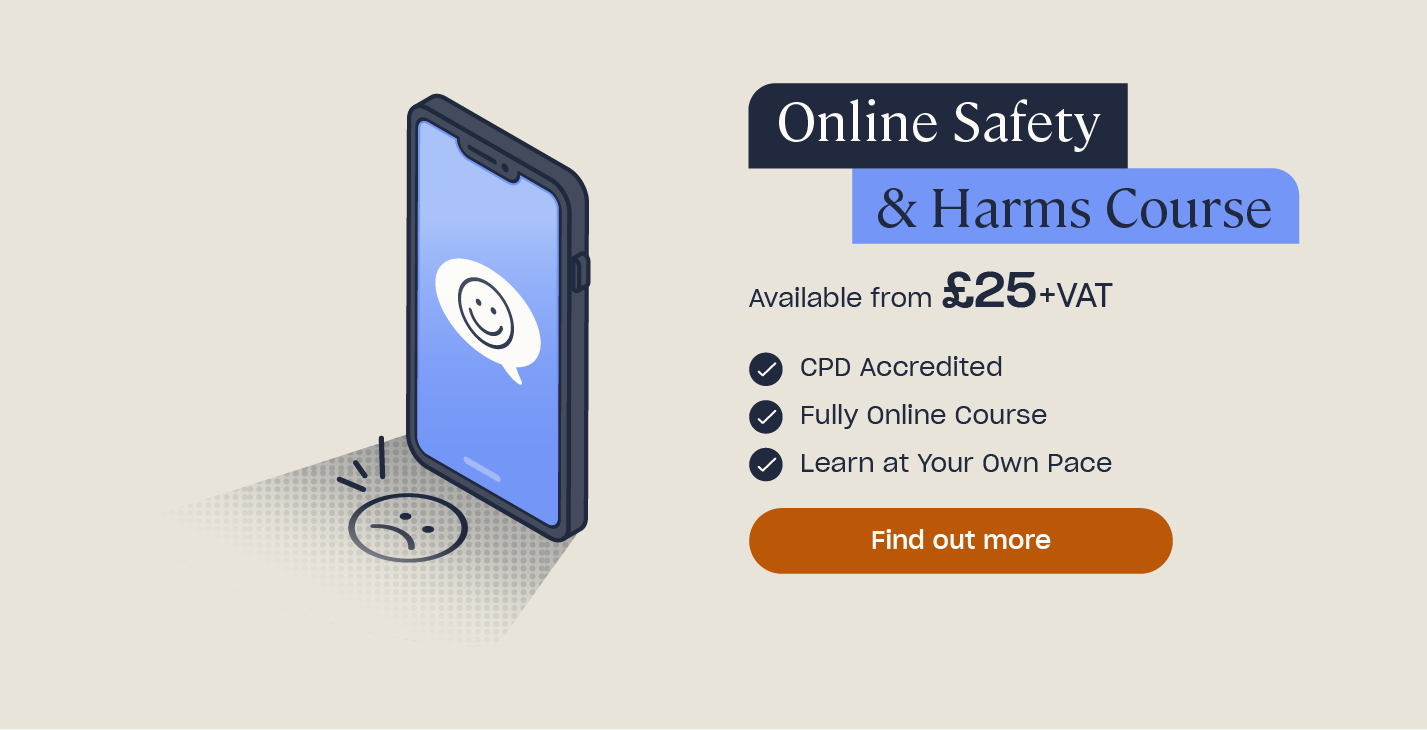The Importance of Routine for Children: Free Weekly Planner
Routine is important for each and every one of us. Without a routine, we are thrown into a state of disarray, often unsure of what we should be doing or even what day of the week it is. For children, having a routine is particularly important, especially for the sake of their mental health and behaviour.
This article will provide tips and ideas to add to your weekly routine, as well as a downloadable weekly planner, that you can use to regain some structure during these unprecedented times.
Why is Routine Important for Children?
Having a routine helps to bring consistency and comfort to a child’s life, as well as providing a sense of normality. Children tend to fear the unknown, and while change is important in life, it can also create a lot of added stress for children. Routine helps to reduce this stress and brings with it a feeling of security.

The benefits of implementing a routine for children are vast and very wide-ranging. Having a routine:
- Teaches a child the importance of time management as well as helping them to follow a schedule. For example, if your child goes to bed at the same time every night, then they will soon begin to learn that the hour before bedtime is their time to begin winding down.
- Helps to set expectations. For example, rather than having a debate at dinner time about who has the job to set the table, if it’s written in someone’s weekly planner then they’ll know that it’s their job and they will be prepared to do it.
- Gives a child confidence and independence. If a child has a task written in their weekly planner, even if it’s something as small as brushing their teeth before they go to bed, then they will be able to look at their planner and know to do this themselves rather than having to be told, which will instil a sense of independence and pride.
- Creates habits. Whether it’s brushing their teeth in the morning or completing their homework before dinner time, having a routine in place helps to create these habits in children and teaches them how to manage their time.
- Helps children to get excited about what’s coming up. If children know what to expect, such as watching a film together one evening or making pizzas together at the weekend, then they have something to look forward to.
Finally, and perhaps the greatest benefit for having a routine for children during this pandemic, is that a routine offers stability and something constant for children when times are often uncertain, uncontrollable, and unpredictable. While we cannot control what is happening outside of our homes and in the world around us, we can control what happens within it. When you create a routine, you help to instil a sense of normality in a child’s life and ease the stress of the outside world.
Five Ideas to Add to Your Child’s Weekly Routine
Pressure and stress levels are high at this time, and you don’t want to add to this by creating a routine that’s too complex or has unrealistic daily targets, for both your child and for yourself. A planner doesn’t need to be complicated or filled with dozens of ideas for it to be effective. Below are some tips we have for following a routine, as well as ideas that you can add into your own planner.
Follow a Similar Routine to Usual
Although the current times are far from normal, following your usual routine as much as possible can help to bring about a sense of normality. For children, this can mean getting up at the same time everyday as they would if they were going to school, having all three meals at the same time throughout the day, and having structured times for other activities, such as for taking naps, exercising, and going to bed on a night.
Additionally, while it can be tempting to stay in pyjamas all day, you should encourage your children to get dressed. This will help to boost productivity and ensure a separation between daytime and nighttime.
Stay Active
Encourage your children to get up and move around during the day. As well as making the most of your one allocation of outdoor exercise everyday, which you could use on a family walk, for example, find new ways to move around at home. This could be anything from skipping in the garden, running up the stairs a few times, or engaging in more structured activity. For example, Joe Wicks is streaming P.E. lessons that all children, regardless of their age, equipment, and available space, can join in with from the comfort of their own home.
As well as having physical benefits, such as strengthening bones, developing muscles and helping to keep children a healthy weight, exercise also has a number of benefits for a child’s mental health. Exercise has been proven to improve a child’s self-confidence and self-esteem, has positive effects on their behaviour and their outlook, and teaches them the importance of exercising and remaining healthy from an early age.

Encourage Learning
Although schools are currently closed for the foreseeable future, that doesn’t mean that learning should be paused. However, it’s important to remember that nobody is expecting you to homeschool your children for six hours a day, five days a week. Don’t put too much pressure on yourself at this time.
There are many resources available online that children can access to ensure they’re keeping their brains ticking and focused. For example, ‘The Maths Factor’ by Carol Vorderman is now free for everyone to join, rather than the usual price of around £2 a week, BBC Teach contains lots of curriculum-mapped videos that are arranged by age and subject as well as live lessons, and Twinkl have opened up their website so that all teachers and parents can use the resources designed for teachers, for free. This includes entire schemes of work, assessments, and online educational games.
What’s more is that learning doesn’t have to be completely curriculum-focused. Even asking your child to help you with preparing dinner can teach them a valuable life skill and about different types of food, reading a book is great for improving a child’s vocabulary and empathy, and encouraging them to be creative through other fun activities like colouring can help to improve their ability to concentrate and focus. Additionally, if you want to teach your children about the importance of environmental awareness, we’ve produced a range of great resources that you could use during this time.
Stay Connected
Social interactions and connections are important for everyone: they’re what make us human and we can get lonely without them. While going out and socialising with our friends isn’t possible during the current lockdown and social distancing measures, keeping in touch with people virtually is not only possible but also encouraged.
Technologies such as Skype, FaceTime, and Zoom are a great way to keep in touch with friends and family members alike and have a virtual face to face conversation. Additionally, messaging apps including WhatsApp and Facebook Messenger are also a great way of keeping in touch with people, so long as all of these apps are used safely.
Manage Screen Time
While keeping in touch with friends and family is incredibly important at this time, it’s also important to ensure that screen time is well managed. With more time on their hands than before, children will be increasing their screen time, whether that is to message their friends, play games online, or try to become TikTok famous. However, it’s important to try and control the time that children are spending looking at screens, as well as ensuring that they are remaining safe online.
It’s beneficial to build free time, which your child could spend on a game or on their phone, into part of their routine. For example, allowing them to do this at a certain time each day, or after completing a piece of schoolwork, will teach your children the importance of taking the time away from their screens, and valuing the time that they do spend on them.

Weekly Routine Planner for Children Template
One great way of making a routine, and sticking to it, is to physically write it down and display it somewhere where all of the family will easily see it. We’ve produced a template for you to use that you can print off, fill in, and display somewhere in your home.
The template contains all seven days of the week as well as different times of the day. We’ve filled one side of the template in to give you inspiration, but the other side is free for you to print and complete. You can download the template using the button below.
Use our downloadable template to help establish a routine that you and your children can stick to.
Further Resources:
- How to Respond to Dangerous Online Challenges: Guidance for Schools
- Parents’ Guides to Social Media Apps
- How to Begin Homeschooling: Guidance & Requirements
- The Homeschooling Debate: Advantages & Disadvantages
- Online Safety & Harms Course













